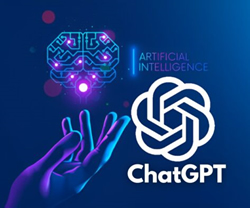Dan Schawbel* discusses the pros and cons of ChatGPT and says while its potential is enormous, it must be used with care.
 The popular artificial intelligence chatbot, ChatGPT reached 100 million users just two months after launching.
The popular artificial intelligence chatbot, ChatGPT reached 100 million users just two months after launching.
The potential for ChatGPT to impact how we work and live is so big that Microsoft has already integrated it into Bing, its search engine.
The impact of ChatGPT is growing rapidly and can’t be ignored.
I believe it will impact every single industry, company, Government Department, and job in one way or another.
Nearly one-third of United States white-collar workers have already used or integrated it into their everyday work.
ChatGPT is a language model developed by OpenAI that uses advanced artificial intelligence and machine learning techniques to generate human-like text.
It was trained on a large corpus of text data, allowing it to understand and respond to a wide range of questions and prompts.
ChatGPT matters because it represents a major step forward in the development of AI and machine learning technology.
Its ability to generate human-like text with remarkable accuracy and consistency has wide-ranging implications for many professions.
According to a study conducted by Deloitte, companies that use AI-powered systems, including ChatGPT, can see an improvement in employee productivity of up to 40 per cent.
ChatGPT’s ability to provide instant support and information can help employees complete tasks more efficiently, freeing up time for more strategic and value-adding activities.
It can help HR departments save money by automating repetitive and time-consuming tasks, such as answering common questions from employees.
ChatGPT can be integrated into chatbots, virtual assistants, and customer service platforms to provide instant, personalised support to employees.
Here are some HR-specific applications of ChatGPT that you can implement.
Data management
ChatGPT can help HR with data entry, employee records management and reports.
Employee Assistance Programs
HR can use ChatGPT to provide 24/7 support to employees with personal or work-related problems.
It can provide personalised support, information, and resources to help employees manage their issues.
Recruitment and talent Acquisition
HR can use ChatGPT to provide instant answers to candidates’ questions about job requirements and the application process.
It can also assist with pre-screening candidates by answering frequently asked questions and helping to identify the most qualified candidates.
In addition, ChatGPT can be used to create job descriptions and conduct initial interviews using specific questions to evaluate candidate responses.
Employee on-boarding
ChatGPT can provide new hires with information on policies, benefits, important contacts, and other details.
A lot of on-boarding programs are inefficient and tedious from both the new hire and HR perspectives.
By using ChatGPT, information is organised and centralised, so it saves HR from having to answer the same questions repeatedly.
Employee retention
It can be used to analyse employee sentiment and provide insights into potential issues workers have that could lead to higher turnover.
By using this data, organisations can tweak their employee experience to increase retention.
Employee training and development
HR can use ChatGPT to provide on-demand training and development opportunities for employees.
ChatGPT can assist with training by answering questions, providing resources, and offering guidance on specific topics.
Performance evaluations
ChatGPT can be used to generate performance evaluations based on data input such as an employee’s job responsibilities and accomplishments.
Employee engagement and feedback
ChatGPT can collect and analyse employee feedback on a variety of topics, such as company culture, management, and work-life balance.
It can also assist with employee engagement by providing information and resources to help employees feel more connected to their work and the organisation.
All this being said, there are several reasons why HR departments should be concerned about the use of ChatGPT in the workplace.
Elimination of jobs
As ChatGPT continues to automate and improve HR processes and administrative tasks, it’s quite possible that HR will downsize.
These tasks include updating documents and staff records, legal compliance, reviewing the organisation’s policies and creating reports.
Legal and ethical issues
ChatGPT’s ability to generate large amounts of data and information about employees raises legal and ethical concerns.
HR departments need to ensure that the use of ChatGPT complies with relevant laws and regulations, and that employees’ personal information is protected.
Bias and fairness
ChatGPT is trained on large amounts of data, which may contain biases and stereotypes.
HR departments need to be aware of these potential biases.
Accuracy and reliability
While ChatGPT is designed to provide accurate and reliable information, it is not infallible.
HR departments need to critically evaluate the information provided by ChatGPT and ensure that it aligns with the organisation’s values and policies.
Employee acceptance and trust
The use of ChatGPT may raise concerns and questions among employees, who may be wary of interacting with an AI-powered system.
HR departments need to ensure that employees understand the benefits and limitations of ChatGPT and are comfortable with its use in the workplace.
Despite the potential risks, ChatGPT has the potential to transform the HR function in organisations by automating repetitive tasks, improving the employee experience, and enhancing the ability to deliver value.
HR departments that embrace this technology will be well positioned to support their organisations in a rapidly changing business environment.
*Dan Schawbel is a bestselling author and Managing Partner of Workplace Intelligence, a research and advisory firm helping HR adapt to trends, drive performance and prepare for the future.
This article is part of his Workplace Intelligence Weekly series.











